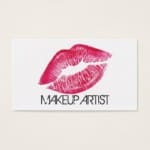Business card etiquette dictates that you should always carry your business card anywhere that you think there is even a small chance that you will be asked for it. You don’t want to be caught without it when asked for one. However, as with anything in social situations, giving out business cards has its own set rules of etiquette. So how do you know what exactly you can and can’t do? Just because you are at a business event does not mean that you should be passing out business cards like free candy; five good business contacts are so much better than passing out 200 useless business cards to people who will never call you.
When asked for your business card, of course you should give to anyone who requests it, that’s good business card etiquette. But better than giving out your card to everyone who you meet and wish to contact again, ask for their card. This ensures that you are able to contact them instead of waiting around for a call that may never come. If you don’t plan on contacting them then you shouldn’t ask for their card.
Good business cards etiquette does not require you call the potential contact back asap… but prefers that you follow up on a contact within a few days of obtaining their information. This could be in the form of a short email, a mailed note, or phone call to say how nice it was to chat and how you would like to continue to stay in touch with them. The purpose of this is to establish you as a business contact and to learn more about the person and a possible business relationship. I have been completely guilty of this mistake…just letting all the business cards that I got at a trade show to just sit there and collect dust. NEVER just put the business cards in a pile or file them never to be used!! Business cards are meant to make business easier, so start using them as soon as possible.
Here are a few rules about making your cards the best business cards you possibly can.
- Your card should be impeccable! If a potential employer does take the time to read your card, then your information should be correct and have as many ways to contact you as possible. The easier it is to contact you, the better chance you have of getting a call back.
- You should avoid using a .edu email address (unless of course you are a professor). Employers sometimes look for these addresses as a way to weed out candidates who won’t be as committed to the job.
- By using your business card to obtain someone else’s card you have firmly secured the ball in your court. You now have the power to contact this person and you should do so as soon as possible if you wish to keep them as a contact. A small note or email will go a long way in making second contact.
- Finally, when you have successfully made contact for the second time, be respectful of their time. Your business card has been successful in getting you this far. Make sure it counts and use your time wisely.
Remember, your business cards won’t get you the job. But they can go a long way in paving the road that lies ahead of you when looking for work. If done correctly and with great care, you can have an elegant and powerful calling card…and this is having the best business cards to represent you.
 About The Author:
About The Author:
John Montana has been a successful salesman since 1990. He has written an ebook about how to record a message on your messaging system that will greatly improve your success rate of potential customers leaving their name and phone numbers. Check it out for yourself… CLICK HERE.

